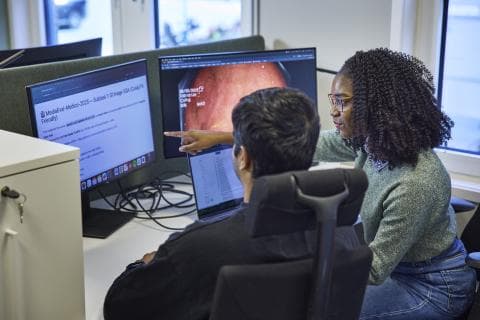Artificial Intelligence
Artificial intelligence (AI) has become a core component in modern society and many areas of science. Simula's AI research is focused on the mathematical foundations, experimental study of algorithms, and development of real-life applications that can be trusted.
The aim is to create methods and tools that contribute to the continued development of AI that benefits society. Example applications include AI assistants for colonoscopies, interview training, and models to generate synthetic data.
At Simula, our AI research is about building systems that are not only more powerful and efficient, but also transparent, safe, and sustainable. Through applied research we make AI useful and practical today, while our long-term research pushes the boundaries so it can serve society in ways we can only begin to imagine tomorrow.
Sven-Arne Reinemo, Research Director at SimulaMet
Departments
While AI is applied and advanced across Simula, these departments lead the development of AI methods, tools, and applications:
Conducts applied AI research through a holistic approach that integrates all components of complex systems to deliver efficient, scalable, and impactful AI applications
→ Data Science and Knowledge Discovery
Advances the frontiers of machine learning and data mining by developing novel methods and algorithms to analyse complex data sets and reveal underlying patterns.
→ Signal and Information Processing for Intelligent Systems
Delivers innovative solutions for intelligent and multimodal sensor networks, information systems, and networked cyber-physical systems, by creating theories and algorithms that blend different disciplines.
→ Centre for Sustainable, Risk-Averse, and Ethical AI (SURE-AI)
Simula hosts one of Norway’s national AI research centres, the Norwegian Centre for Sustainable, Risk-Averse, and Ethical AI (SURE-AI), and is a partner in two more.
Delivers high-quality R&D consulting services to organisations, large and small. Bridging the gap between academic discoveries and real-world challenges.
Examples of AI research can also be found in other research areas. In Scientific Computing, researchers combine AI with physics and high-performance computing to advance the theoretical foundations and applications of mathematical models and computer simulations.
In Software Engineering, AI is used to develop and validate autonomous systems, with a special emphasis on trustworthiness. AI is also used to develop a new generation of methodology and practices for efficient software engineering processes.
Contract research opportunities in Artificial Intelligence
We welcome opportunities to collaborate with government, industry and academic partners to develop machine-learning-based solutions to complex problems in areas such as health, sports and defense.
Spin-out companies
We are proud of the successful Oslo-based spinoff companies that have arisen from our work in machine learning at the Department of Holistic Systems (HOST).
→ Forzasys specialises in technology for sports analytics, namely: video streaming technology, distributed systems, networks and machine learning.
→ Augere creates technology based on video analytics and machine learning to analyse colonoscopy videos, helping doctors detect cancer.
→ Innsikt.ai have developed a realistic and practical interview training platform for professionals working with children. Integrating cutting-edge AI with best-practices in child psychology.

